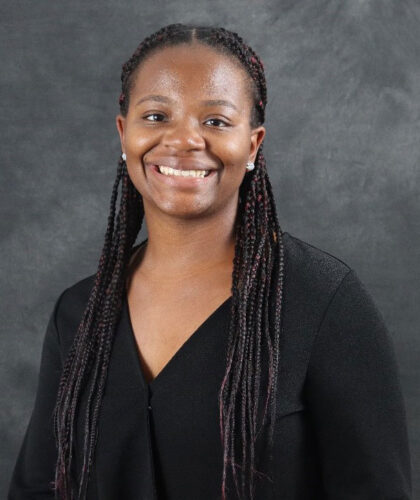Meet Kasey Elder
Written by Dr John F. Odhiambo (SSR Diversity Committee) in celebration of Black History Month
February is Black History Month! The SSR Diversity Committee is participating in this celebration! This time, Dr. John F. Odhiambo (SSR Diversity Committee) met with Kasey Elder to discuss her goals, dreams, achievements, and history. Enjoy the reading!

JO. Tell us a bit about your background and current position
KE. Hello, my name is Kasey Elder. I was born in Petersburg, Virginia, and raised in Apollo Beach, Florida. My journey of loving animals and science started in middle school when I joined my local FFA and 4-H chapters. In these organizations, I showed rabbits, pigs, and cattle at county and state fairs. I competed in veterinary and agriculture-related career development events (CDEs). Fast forward to college and attending Florida Agricultural and Mechanical University for my bachelor’s and master’s degrees in agriculture science with a concentration in animal science. At FAMU, my research explored the effects of various prenatal stressors on offspring physiology, including nutrition and environmental stressors. I am currently a Ph.D. student in the Department of Animal and Dairy Sciences at Mississippi State University and plan on continuing research in developmental programming.
JO. What were your biggest academic and scientific challenges when working with reproduction?
KE. Academically, reproduction requires a multidisciplinary approach, requiring me to good understanding of genetics, nutrition, physiology, biochemistry and the environment. Connecting these different areas can be challenging. Scientifically, reproduction studies require close attention to detail. I have experienced issues with data collection, experimental design, and integrating diverse variables such as weather.
JO. How did you overcome those challenges?
KE. To overcome these challenges, it has been vital to work with colleagues, ask knowledgeable mentors for advice, and stay current on the most recent articles related to developmental programming. I also had to be adaptable and use troubleshooting strategies to overcome setbacks.
JO. In what ways did your heritage affect your perspective and your career trajectory?
KE. My upbringing and background have greatly impacted how I view the world and my professional advancement. My experience as an African American woman has been marked by a unique blend of cultural values, resilience, and a drive to overcome obstacles. My family taught me the value of hard work, perseverance, and community support when I was growing up, and these values have acted as a guide in every aspect of my life.
JO. What are your future career goals, after you get your PhD?
KE. My future career goals are to work in applied research and investigate different models of developmental programming to improve animal health, welfare, and industry sustainability in either the private sector or with government agencies.
JO. Any final words for someone that may get inspired reading this blog?
KE. To anyone reading this blog, Pursue your interests wholeheartedly, even if the path seems challenging. Surround yourself with a supportive network, and don’t be afraid to ask for help. Setbacks are a natural part of any journey, and it’s through overcoming challenges that we grow the most.

